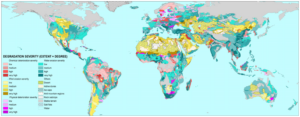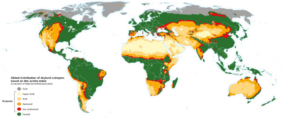
World Environment Day is celebrated on June 5 every year to create global environmental awareness. Over the last 50 years, the day has evolved into a vital platform for motivating organisations and communities worldwide to champion environmental preservation. This year, the United Nations has announced the theme ‘Land Restoration, Desertification, and Drought Resilience’ to highlight the urgent need for collective action to safeguard our planet’s ecosystems in the face of mounting environmental challenges.
World Environment Day highlights the environmental challenges such as pollution and climate change, and educates people on their implications. It promotes community initiatives such as climate action campaigns and afforestation, offers a platform for policymakers to implement ecological policies, and fosters global collaboration. Additionally, it showcases innovative solutions that inspire sustainable practices for a better future. However, current efforts are insufficient. We need swift, combined action through effective policies and individual commitment to address this crisis.
READ I Spectrum auctions: Telco enthusiasm fades in latest round
State of deforestation and desertification
The current state of the environmental crisis, leading to rapid deforestation, land degradation, and desertification, demands immediate action. Pollution, climate change, and biodiversity loss have rendered once-fertile lands barren, transforming them into deserts and dead zones. This degradation not only threatens biodiversity but also precipitates crop failures, dwindling water resources, economic instability, and the displacement of vulnerable communities, exacerbating global inequalities.
The Global Drought Snapshot 2023 paints a dire picture of the escalating drought crisis, with severe repercussions felt across the globe. From China to the Horn of Africa to the United States, millions grapple with food insecurity, agricultural losses, and economic downturns due to water scarcity. According to the snapshot, the global impact of drought is severe, with 15-20% of China’s population facing frequent droughts and an expected 80% increase in drought intensity by 2100. In 2022, 23 million people in the Horn of Africa faced severe food insecurity, while the United States had 5% of its area suffering severe drought in May 2023.

Droughts have led to significant agricultural damage, such as a 70% reduction in cereal crops in the Mediterranean and a 44% drop in Argentina’s soybean production in 2023 that led to a 3% drop in Argentina’s GDP. These conditions disproportionately affect low- and middle-income countries, where 85% of the people affected by droughts live, emphasising the critical need for global cooperation to address this escalating crisis.

Bruno Pozzi, Deputy Director of the United Nations Environment Programme’s Ecosystems Division, emphasises the significant responsibility of both governments and businesses to reverse humanity’s damage to the Earth. He underscores the crucial role that individuals also hold in restoration efforts, highlighting its importance for our species’ future.
Message of World Environment Day
The urgency of addressing environmental challenges cannot be overstated. Rising temperatures, greenhouse gas emissions, erratic weather patterns, and natural disasters demand immediate and concerted efforts to safeguard our planet’s future. Urgent action is needed to restore ecosystems, halt deforestation, and fulfil biodiversity commitments. Moreover, increasing financial support for developing countries is crucial in building resilience against environmental threats and fostering sustainable development.
In addition to land restoration efforts, combating plastic pollution emerges as a pressing imperative. The indiscriminate use of plastic wreaks havoc on marine life, ecosystems, and human health, particularly affecting vulnerable populations worldwide. Meaningful action to curb plastic consumption and promote sustainable alternatives is essential in mitigating this environmental crisis.
As we observe World Environment Day 2024, let us heed the call for action and commit to tangible steps towards a sustainable future. By prioritising environmental conservation, fostering global cooperation, and embracing innovative solutions, we can mitigate the looming environmental crisis and safeguard the planet for generations to come. It is time to “walk the talk” and take decisive action to preserve our planet’s precious resources for future generations.
(Dr Md Mashhood Alam is Project Lead at National CSR Network. Views are personal.)
